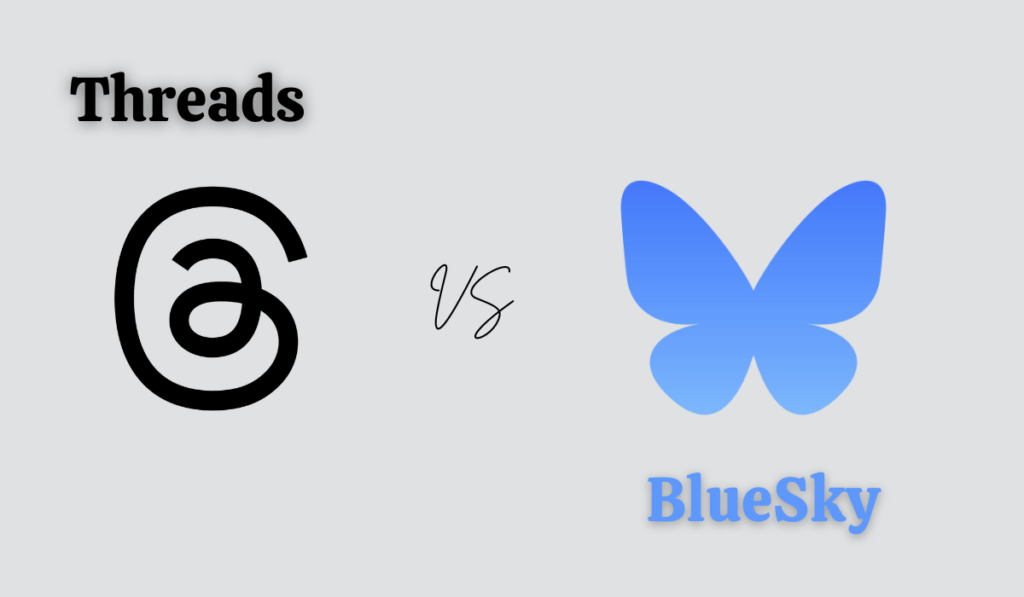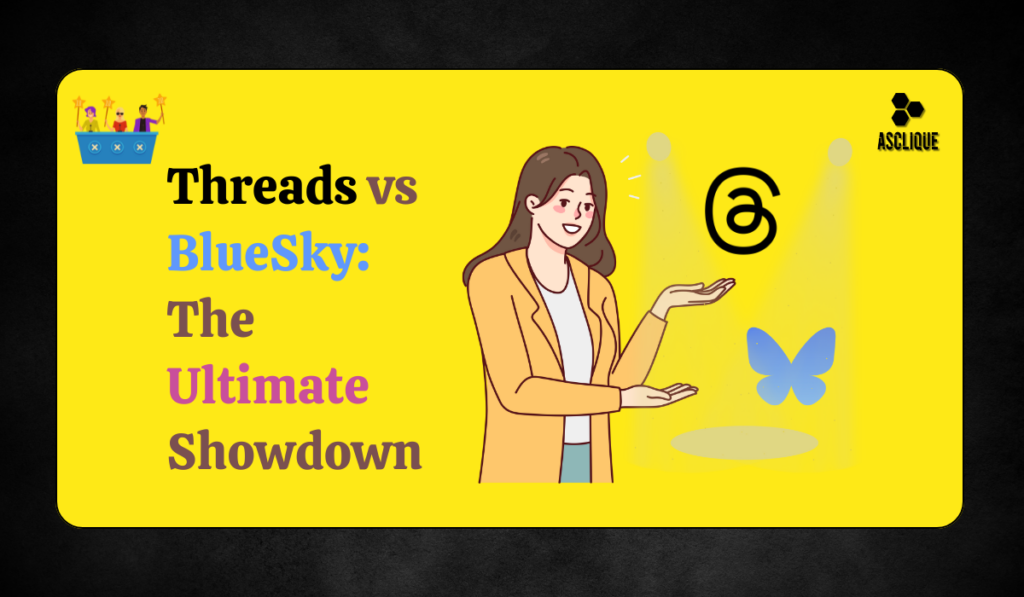As social media changes with great rapidity, new platforms have continued to evolve and disrupt the way we interact online. Threads and BlueSky are two new platforms with loud and clear intentions of making a break with the past in terms of what microblogging, networking, and socializing traditionally stood for. This article takes a dive into Threads vs. BlueSky to look into the features crafted into both platforms: the nuts and bolts of both Threads and BlueSky versus their advantages and disadvantages. In the end, we shall draw an elaborate differentiating line for your final choice in the app to go with.
What is Threads?
Threads is a microblog for posting short entries or microblogging randomly operated by Meta (previously Facebook) and started in 2023 to rival Twitter (now X) and other sites. Threads are more or less a real-time site that supports the posting of textual updates, photos, videos, and links, representing refreshing-updates on short-form content. Another ingredient of Threads stemming from the Meta product is highly regarded integration with Instagram and Facebook, which allows the user to connect to their existing social networks. Therefore, Threads basically looks into providing a more user-friendly platform for sharing sentiments, updates, and discussions that are entertaining and fast.
What is BlueSky?
In essence, BlueSky was established by Twitter co-founder Jack Dorsey as a social media utility. Unlike other existing social media platforms that remain only to one centralized entity to own and control, BlueSky runs on a decentralized protocol, meaning no entity controls the network. This means more data and interaction control for the users. Supporters suggest that BlueSky should promote an open, transparent, and privacy-minded alternative to existing social media, a combination of two big factors: community-based governance and freedom of expression.
Features of Threads vs BlueSky
Both Threads vs BlueSky offer compelling features, though their approaches and functionalities differ significantly. Here’s a comparison of key features:
| Feature | Threads | BlueSky |
|---|---|---|
| Ownership | Owned by Meta (centralized) | Decentralized, no single ownership |
| User Interface | Similar to Instagram, easy-to-use | Minimalist, clean design |
| Integration | Integrated with Instagram/Facebook | No direct integration with other platforms |
| Content Type | Text, photos, videos, links | Text-based posts, photos, videos |
| Privacy | Standard privacy settings (Meta’s policies) | Higher privacy, decentralized control |
| Monetization | Ads (future plans for integration) | No clear monetization strategy yet |
| Moderation | Centralized, controlled by Meta | Community-driven, decentralized moderation |
| Open Source | No | Yes |
Pros and Cons of Threads vs BlueSky
Pros of Threads
- Complete Integration: Threads would be closely attaching Instagram and Facebook users for a richer user experience towards Meta.
- Very Clear: The design of the platform is very clear and makes it easy for users to understand and interact.
- A Lot of Users: Simple but works-the largest audience from Meta is instantly available to millions of users for quick engagement and for any content that is probably going to go viral.
Cons for Threads
- Complete centralized control: All platform control is resting on Meta’s shoulders. Users, therefore, must abide by any company’s regulations and practices related to its data, which could negatively impact privacy-loving individuals.
- Restricted User Experience: Threads has much less a grip on users’ experience than decentralized platforms such as BlueSky.
BlueSky Benefits
- De-centralization: BlueSky’s decentralized structure gives users the greatest control over the way they see their data and interactions; no one entity owns the platform.
- Community-based moderation: Instead of centralized censorship, it uses community moderation that provides more democratic governance.
- Open-source: BlueSky, being an open-source platform, thrives on transparency, flexibility, and collaborative innovation, thus giving users’ interest in innovation and privacy.
BlueSky Disadvantages
Small User Base: BlueSky is the new decentralized and private site that is still home to a much smaller user base compared to other centralized platforms like the Threads.
Fewer Features: BlueSky is still under construction and not as enriched in features as Threads promotes, lacking many of the integrations and tools offered by the larger platforms.
Detailed Differentiation: Threads vs BlueSky

When comparing Threads vs BlueSky, the most noticeable difference is their approach to control and data management.
Centralized versus Decentralized Ownership
- Meta owns Threads, and therefore, as a centralized corporation, it controls all operations of the platform including but not limited to user data, content moderation, and advertising. Users on Threads operate under the policies that Meta sets, wherein Meta itself handles content moderation.
- BlueSky goes in so many ways to be decentralized; hence no single organization or entity runs the platform. Users have more control over their data, in a sense, due to participation in the community-oriented ecosystem. This decentralization enhances privacy as well as an open and transparent environment.
User Privacy and Data Control
- On Threads, Meta’s customary practices determine privacy and data control. Therefore, some of the users may feel hesitant to join the platform given that earlier criticisms were directed toward Meta for data handling.
- BlueSky, by design, is more privacy-preserving. There are decentralized systems, so they can give users further control over their data, and users can track how the data is being used in a manner that brings transparency, given that BlueSky operates as an open-source project.
User Interface & Experience
- Threads has an overall user-friendly interface that very much connects with Meta’s other platforms, especially with Instagram. This connectivity therefore empowers users with an effortless way of sharing content on various Meta-owned services and provides a unified experience for every user immersed and engaged in the ecosystem.
- BlueSky prefers a more simple approach, with a clean and minimalistic interface. Although it does not boast a comprehensive set of Threads-style integrations, it aims for a more neutral-and-)open experience for users looking to break away from the social media landscape.
Moderation of Content
- Meta centralizes and controls the moderation of content on Threads. This means that Meta policies will determine what is acceptable on the platform. Consequently, content moderation can be implemented inconsistently or with bias.
- On the other hand, BlueSky is an example of community moderation, whereby each group or network can set its own rules and parameters. This decentralizes the moderation of content and allows people to enjoy expression further.
Audience and Growth
- Threads leverage Meta’s large user base to quickly ramp up growth and have a wide reach. But with that comes the downside of corporate control inevitable on a Meta-managed space.
- BlueSky is in the early days and has a niche audience mainly interested in decentralization and privacy. So, while it has a smaller base, it caters to those who want to move away from the idea of corporate control and seek a more democratic social media experience.
Which Should You Choose?
Choose Threads if
- You are active on Meta’s platforms (Instagram, Facebook) and want a holistic social media experience.
- An interaction and rapid-fire viral environment with a highly populous user base works for you.
- You don’t mind centralized control under Meta and its policies.
Choose BlueSky if
- Privacy and decentralization are something you care about; for example, you want control over your own data.
- You support open-source environments and moderation of content by the community.
- You can afford to rebel against larger flocking communication platforms and works-in-progress features.
Also Read: Micro-Influencers Revenue Streams: How They Monetize Their Influence & Build Sustainable Income
Conclusion
Threads and BlueSky both hold great potential for different types of audiences. While Threads is for the user looking for full integration with Meta’s services and more established users, BlueSky is a platform for others who want privacy and decentralization along with greater acceptance of community moderation. In other words, your choice will be based on the features and values that matter most to you.
FAQs
What has to be the main difference between Threads and BlueSky?
Threads is a centralized platform owned by Meta, while BlueSky is decentralized, giving users more control over their data.
Can Threads and BlueSky be used simultaneously?
These two platforms become independent entities without direct integration into one another, so using them in tandem is certainly possible.
Which platform is better for privacy—Threads or BlueSky?
BlueSky is great for one’s privacy as it is decentralized, while Threads are under Meta measures for privacy.
Can I monetize my content on Threads or BlueSky?
Monetizing on Threads will most likely use Ads; BlueSky is yet to clearly articulate any monetizing strategy.
Which one among Threads and BlueSky have more users?
Threads are better as to having a huge user base because of the ecosystem that surrounds Meta, while BlueSky caters for a smaller audience that is privacy freak.

